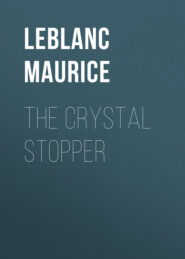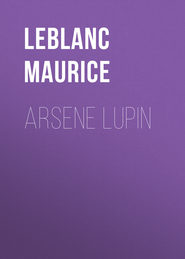По всем вопросам обращайтесь на: info@litportal.ru
(©) 2003-2025.
✖
The Extraordinary Adventures of Arsene Lupin, Gentleman-Burglar
Настройки чтения
Размер шрифта
Высота строк
Поля
“What is true?”
“Oh! nothing.”
What was the meaning of Lupin’s reticence? It was quite obvious that he had not told me everything; there was something he was loath to tell. His conduct puzzled me. It must indeed be a very serious matter to cause such a man as Arsène Lupin even a momentary hesitation. I threw out a few questions at random.
“Have you seen them since?”
“No.”
“And have you never experienced the slightest degree of pity for those unfortunate people?”
“I!” he exclaimed, with a start.
His sudden excitement astonished me. Had I touched him on a sore spot? I continued:
“Of course. If you had not left them alone, they might have been able to face the danger, or, at least, made their escape with full pockets.”
“What do you mean?” he said, indignantly. “I suppose you have an idea that my soul should be filled with remorse?”
“Call it remorse or regrets—anything you like–”
“They are not worth it.”
“Have you no regrets or remorse for having stolen their fortune?”
“What fortune?”
“The packages of bonds you took from their safe.”
“Oh! I stole their bonds, did I? I deprived them of a portion of their wealth? Is that my crime? Ah! my dear boy, you do not know the truth. You never imagined that those bonds were not worth the paper they were written on. Those bonds were false—they were counterfeit—every one of them—do you understand? THEY WERE COUNTERFEIT!”
I looked at him, astounded.
“Counterfeit! The four or five millions?”
“Yes, counterfeit!” he exclaimed, in a fit of rage. “Only so many scraps of paper! I couldn’t raise a sou on the whole of them! And you ask me if I have any remorse. THEY are the ones who should have remorse and pity. They played me for a simpleton; and I fell into their trap. I was their latest victim, their most stupid gull!”
He was affected by genuine anger—the result of malice and wounded pride. He continued:
“From start to finish, I got the worst of it. Do you know the part I played in that affair, or rather the part they made me play? That of André Brawford! Yes, my boy, that is the truth, and I never suspected it. It was not until afterwards, on reading the newspapers, that the light finally dawned in my stupid brain. Whilst I was posing as his “saviour,” as the gentleman who had risked his life to rescue Mon. Imbert from the clutches of an assassin, they were passing me off as Brawford. Wasn’t that splendid? That eccentric individual who had a room on the second floor, that barbarian that was exhibited only at a distance, was Brawford, and Brawford was I! Thanks to me, and to the confidence that I inspired under the name of Brawford, they were enabled to borrow money from the bankers and other money-lenders. Ha! what an experience for a novice! And I swear to you that I shall profit by the lesson!”
He stopped, seized my arm, and said to me, in a tone of exasperation:
“My dear fellow, at this very moment, Gervaise Imbert owes me fifteen hundred francs.”
I could not refrain from laughter, his rage was so grotesque. He was making a mountain out of a molehill. In a moment, he laughed himself, and said:
“Yes, my boy, fifteen hundred francs. You must know that I had not received one sou of my promised salary, and, more than that, she had borrowed from me the sum of fifteen hundred francs. All my youthful savings! And do you know why? To devote the money to charity! I am giving you a straight story. She wanted it for some poor people she was assisting—unknown to her husband. And my hard-earned money was wormed out of me by that silly pretense! Isn’t it amusing, hein? Arsène Lupin done out of fifteen hundred francs by the fair lady from whom he stole four millions in counterfeit bonds! And what a vast amount of time and patience and cunning I expended to achieve that result! It was the first time in my life that I was played for a fool, and I frankly confess that I was fooled that time to the queen’s taste!”
VIII. The Black Pearl
A violent ringing of the bell awakened the concierge of number nine, avenue Hoche. She pulled the doorstring, grumbling:
“I thought everybody was in. It must be three o’clock!”
“Perhaps it is some one for the doctor,” muttered her husband.
“Third floor, left. But the doctor won’t go out at night.”
“He must go to-night.”
The visitor entered the vestibule, ascended to the first floor, the second, the third, and, without stopping at the doctor’s door, he continued to the fifth floor. There, he tried two keys. One of them fitted the lock.
“Ah! good!” he murmured, “that simplifies the business wonderfully. But before I commence work I had better arrange for my retreat. Let me see.... have I had sufficient time to rouse the doctor and be dismissed by him? Not yet.... a few minutes more.”
At the end of ten minutes, he descended the stairs, grumbling noisily about the doctor. The concierge opened the door for him and heard it click behind him. But the door did not lock, as the man had quickly inserted a piece of iron in the lock in such a manner that the bolt could not enter. Then, quietly, he entered the house again, unknown to the concierge. In case of alarm, his retreat was assured. Noiselessly, he ascended to the fifth floor once more. In the antechamber, by the light of his electric lantern, he placed his hat and overcoat on one of the chairs, took a seat on another, and covered his heavy shoes with felt slippers.
“Ouf! Here I am—and how simple it was! I wonder why more people do not adopt the profitable and pleasant occupation of burglar. With a little care and reflection, it becomes a most delightful profession. Not too quiet and monotonous, of course, as it would then become wearisome.”
He unfolded a detailed plan of the apartment.
“Let me commence by locating myself. Here, I see the vestibule in which I am sitting. On the street front, the drawing-room, the boudoir and dining-room. Useless to waste any time there, as it appears that the countess has a deplorable taste.... not a bibelot of any value!…Now, let’s get down to business!… Ah! here is a corridor; it must lead to the bed chambers. At a distance of three metres, I should come to the door of the wardrobe-closet which connects with the chamber of the countess.” He folded his plan, extinguished his lantern, and proceeded down the corridor, counting his distance, thus:
“One metre.... two metres.... three metres....Here is the door....Mon Dieu, how easy it is! Only a small, simple bolt now separates me from the chamber, and I know that the bolt is located exactly one metre, forty-three centimeters, from the floor. So that, thanks to a small incision I am about to make, I can soon get rid of the bolt.”
He drew from his pocket the necessary instruments. Then the following idea occurred to him:
“Suppose, by chance, the door is not bolted. I will try it first.”
He turned the knob, and the door opened.
“My brave Lupin, surely fortune favors you....What’s to be done now? You know the situation of the rooms; you know the place in which the countess hides the black pearl. Therefore, in order to secure the black pearl, you have simply to be more silent than silence, more invisible than darkness itself.”
Arsène Lupin was employed fully a half-hour in opening the second door—a glass door that led to the countess’ bedchamber. But he accomplished it with so much skill and precaution, that even had had the countess been awake, she would not have heard the slightest sound. According to the plan of the rooms, that he holds, he has merely to pass around a reclining chair and, beyond that, a small table close to the bed. On the table, there was a box of letter-paper, and the black pearl was concealed in that box. He stooped and crept cautiously over the carpet, following the outlines of the reclining-chair. When he reached the extremity of it, he stopped in order to repress the throbbing of his heart. Although he was not moved by any sense of fear, he found it impossible to overcome the nervous anxiety that one usually feels in the midst of profound silence. That circumstance astonished him, because he had passed through many more solemn moments without the slightest trace of emotion. No danger threatened him. Then why did his heart throb like an alarm-bell? Was it that sleeping woman who affected him? Was it the proximity of another pulsating heart?
He listened, and thought he could discern the rhythmical breathing of a person asleep. It gave him confidence, like the presence of a friend. He sought and found the armchair; then, by slow, cautious movements, advanced toward the table, feeling ahead of him with outstretched arm. His right had touched one of the feet of the table. Ah! now, he had simply to rise, take the pearl, and escape. That was fortunate, as his heart was leaping in his breast like a wild beast, and made so much noise that he feared it would waken the countess. By a powerful effort of the will, he subdued the wild throbbing of his heart, and was about to rise from the floor when his left hand encountered, lying on the floor, an object which he recognized as a candlestick—an overturned candlestick. A moment later, his hand encountered another object: a clock—one of those small traveling clocks, covered with leather. –
Well! What had happened? He could not understand. That candlestick, that clock; why were those articles not in their accustomed places? Ah! what had happened in the dread silence of the night?
Suddenly a cry escaped him. He had touched—oh! some strange, unutterable thing! “No! no!” he thought, “it cannot be. It is some fantasy of my excited brain.” For twenty seconds, thirty seconds, he remained motionless, terrified, his forehead bathed with perspiration, and his fingers still retained the sensation of that dreadful contact.
Making a desperate effort, he ventured to extend his arm again. Once more, his hand encountered that strange, unutterable thing. He felt it. He must feel it and find out what it is. He found that it was hair, human hair, and a human face; and that face was cold, almost icy.
However frightful the circumstances may be, a man like Arsène Lupin controls himself and commands the situation as soon as he learns what it is. So, Arsène Lupin quickly brought his lantern into use. A woman was lying before him, covered with blood. Her neck and shoulders were covered with gaping wounds. He leaned over her and made a closer examination. She was dead.
“Dead! Dead!” he repeated, with a bewildered air.
He stared at those fixed eyes, that grim mouth, that livid flesh, and that blood—all that blood which had flowed over the carpet and congealed there in thick, black spots. He arose and turned on the electric lights. Then he beheld all the marks of a desperate struggle. The bed was in a state of great disorder. On the floor, the candlestick, and the clock, with the hands pointing to twenty minutes after eleven; then, further away, an overturned chair; and, everywhere, there was blood, spots of blood and pools of blood.











